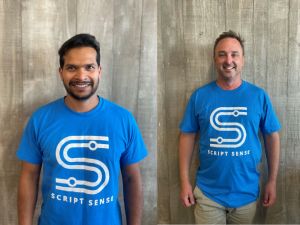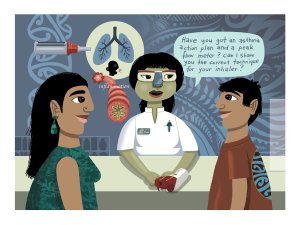Academic pharmacist Nataly Martini discusses the medical management of asthma in adults and adolescents, which has evolved to prioritise early anti-inflammatory treatment. She also explains how to improve patient outcomes by proactively identifying poor asthma control and supporting equitable access to education and treatment
‘Overhyped’ claim 2247 deaths per year are due to medication errors
‘Overhyped’ claim 2247 deaths per year are due to medication errors

Haha. I very much doubt the figure
A former health researcher says a claim over 2000 deaths are caused in New Zealand each year by medication errors is a gross overestimation.
Puneet Saini, a University of Canterbury Master of Business Administration student who has developed software to reduce mistakes in pharmacies, claims the number of deaths from medicine errors in New Zealand is higher than the road toll [340 last year].
And a press release on the university’s website about his company says: “Script Sense is a cloud-based pharmacy management platform that aims to reduce the 2000 deaths a year that are caused by medicine-related errors in Aotearoa New Zealand.”
When Pharmacy Today queried the figure, Mr Saini, who is a locum pharmacist, quoted an October 2021 article on the Health Informatics New Zealand website titled “Electronic Medication Management – Why?”, which says, “Medication error is attributed to be the cause of an estimated 2247 deaths per year in New Zealand."
The article wasn’t written by a journalist; instead, the author was Kaye Hocking, the marketing and partnerships director of Alcidion, an international health technology company. Ms Hocking did not respond to our emailed questions about where the number came from.
The Pharmacy Council quoted the same figure in its submission on the Therapeutic Products Bill. The document says, “Medication error is the attributed cause of an estimated 2247 deaths per year in New Zealand.”
The council’s chief executive, Michael Pead, told Pharmacy Today the organisation got the figure from the HiNZ article. Via email, Mr Pead says it’s also in a 2019 presentation to the Nurses Organisation given by Billy Allan, Te Whatu Ora pharmacist services principal service development manager, when he worked for the Health Quality & Safety Commission.
However, on page 26 the presentation says 2247 people die every year in New Zealand as a result of adverse medicine events [not just errors]. It also says the data is based on hospital events and the values depend on which study is used and the assumptions used in the calculations.
Mr Allan says the figure was extrapolated from “Medication-related patient harm in New Zealand hospitals” by Robb and colleagues, published in the New Zealand Medical Journal in 2017. However, he told Pharmacy Today via email that he could not find the calculations or assumptions used to reach it. The NZMJ article does not mention the 2247 number that has been quoted.
“Haha. I very much doubt the figure,” says retired health services researcher Peter Davis, who worked at the University of Auckland and the University of Canterbury.
Dr Davis, who is still an honorary professor in the department of statistics and an emeritus professor in population health and social science at the University of Auckland, says the number is much lower than what has been claimed.
A study by Dr Davis and other researchers, “Representative case series from public hospital admissions 1998 I: drug and related therapeutic adverse events”, published in the New Zealand Medical Journal in January 2004, found less than a quarter of hospital patient harm events were related to drugs or therapeutic interventions.
Cardiovascular drugs were most often to blame, and antibiotic diarrhoea and hypersensitivity were common.
The proportion of those associated with death and disability was 11.4 per cent. Dr Davis says they weren’t all preventable and weren’t all directly due to the adverse event.
Another paper Dr Davis and colleagues had published in NZMJ in March 2006, “Representative case series from New Zealand public hospital admissions in 1998 – III: Adverse events and death”, found the number of adverse events preventable deaths was 1.3 per thousand.
“If there are half a million public hospital admissions, this means about 500 deaths overall, of which a quarter might be drug and therapeutic-related.”
Dr Davis says that would be around 200 deaths, about 10 per cent of what’s been claimed. “Still worth thinking about, but overhyped.”
However, he says medication errors are important because medication is a frequent intervention. “And it is an area of patient harm that, unlike many others, is among the most straightforward to fix, and an electronic system is the way to go.”
Dr Davis says he had a close family experience of this, where a handwritten script by a junior hospital doctor had the decimal point in the wrong place which resulted in an old man being overdosed: “An electronic system would have picked that up.”
A 2002 study of the prevalence of medication errors in the US, “Medication errors observed in 36 health care facilities”, found 56 per cent of adverse drug events detected were due to prescribing errors and 44 per cent to the drug’s administration.
In New Zealand, an Official Information Act response from the HQSC in November 2022 shows there were just five events where a medication error reported to the commission potentially contributed to the death of a patient in 2021/22. During 2015/16 it ranged from one to three.
Mr Saini says those HQSC figures are from complaints made by family or friends of a deceased person so “may not reflect the true numbers”.
Since this article was first published HQSC since contacted Pharmacy Today to say it collects adverse events data, not consumer complaints.
“From Script Sense’s perspective any number beyond 0 is problematic and every effort should be made to prevent it,” he says.
“I’m not debating the numbers, but I am saying there is patient harm that is happening in pharmacies in New Zealand, where there are near-misses or medicine that causes harm to patients.
“A lot of the time, it gets picked up and the error never goes anywhere else.”
However, Mr Saini says Script Sense wants to reduce and prevent patient harm: “We are building technology that will help prevent that harm happening.”








